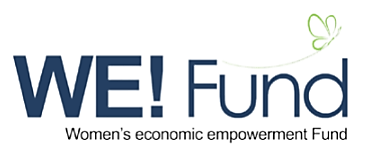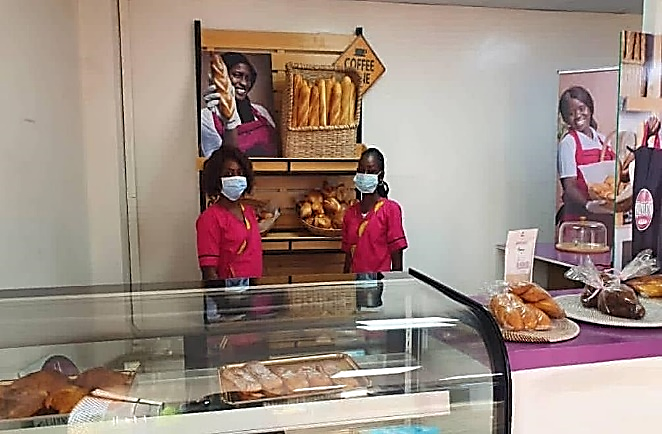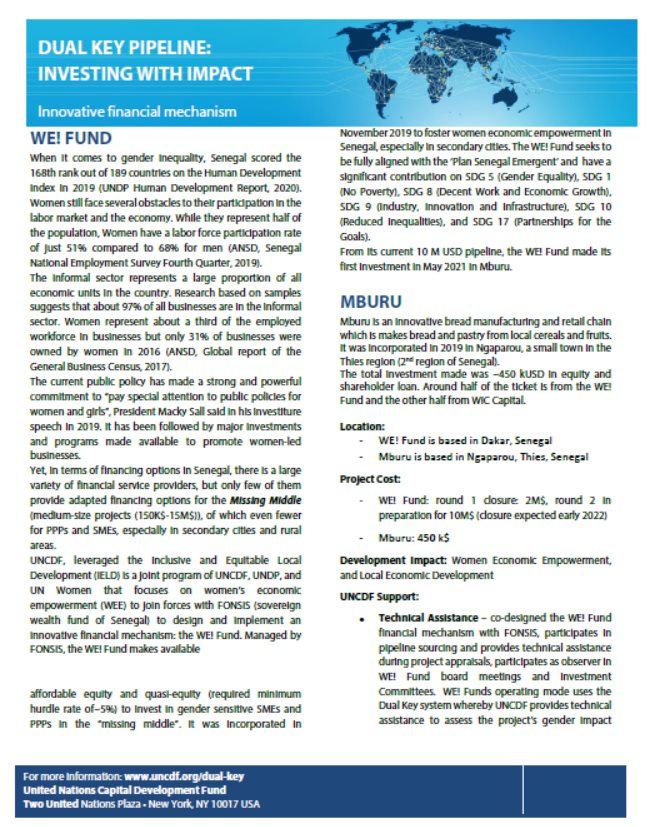
The WE! Fund is a financial mechanism using equity and shareholder loans to invest in gender sensitive SMEs and PPPs in the “missing middle”. The WE! Fund was incorporated in November 2019 as a joint initiative from UNCDF and FONSIS to foster women economic empowerment in Senegal, especially in secondary cities. The WE! Fund seeks to be fully aligned with the ‘Plan Sénégal Emergent’ and have a significant contribution on SDG 5 (Gender Equality), SDG 1 (No Poverty), SDG 8 (Decent Work and Economic Growth), SDG 9 (Industry, Innovation and Infrastructure), SDG 10 (Reduced Inequalities), and SDG 17 (Partnerships for the Goals).
From its current 10 M USD pipeline, the WE! Fund made its first investment in May 2021 in Mburu, an innovative bread manufacturing and retail chain which is makes bread and pastry from local cereals and fruits.
This investment is being featured by Mr Amarou AW. He is the Local Finance Initiative Investment Officer in Dakar. As an important actor of this project’s design and implementation, he answered the following questions:
• What made you enthusiastic about this investment?
In my IO capacity at UNCDF, the WE! Fund is among my first achievements. I was particularly excited by the opportunity to think outside the box and build an innovative mechanism which brings a tangible answer to the critical issue of women economic empowerment, in line with the Government’s priorities. The design of the mechanism was quite exciting and was made possible by a clear vision set by Christel Alvergne, the Regional Technical Advisor for West and Central Africa and a strong support provided from all UNCDF offices through knowledge sharing and technical as well as administrative support.

WE!FUND first investment ( MBURU Senegal)
• What were the challenges faced by this project?
The impact key in the WE! Fund investment process uses the WEE Index (developed by UNDP, UN Women and UNCDF) to assess the projects contribution to women economic empowerment. Conducting these assessments and steering projects towards implementing gender sensitive approaches and internal procedures has been challenging especially with the first projects in the pipeline. Yet, UNCDF managed to act swiftly by mobilising additional gender specialists to provide technical assistance to the WE! Fund to facilitate the assessment process and adoption from the project owners of recommendations to enhance their projects impact on WEE.
• What are the lessons learned from this example?
The key learning for me is that there is a significant room for UNCDF to further unlock public and private finance for SGD sensitive projects. This is made possible by a strong knowledge of country-specific priorities and institutional set-up, UNCDF’s ability to structure a leverage effect of up to x7 by deploying financial resources and technical assistance; and UNCDF’s unique global LFI platform which enables knowledge sharing across our teams around the world.
About Amarou AW:
Amarou has joined UNCDF in March 2019. In his Investment Officer role, he deploys UNCDF’s investment instruments in West, Central and North Africa mostly by building up UNCDF’s pipeline from country-specific priorities, goading projects to an investment-ready status and providing technical assistance to SMEs and Municipalities pre and post-investment.
Amarou is a seasoned investment professional with significant experiences in capital investment and business strategy consulting from leading firms in Senegal, France and UK.
He has an MBA from Ponts Business School and an Engineering degree from Ecole des Ponts ParisTech.
Contact:
Amarou.Aw@uncdf.org


